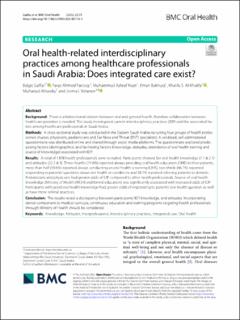| dc.contributor.author | Gaffar, Balgis | |
| dc.contributor.author | Farooqi, Faraz Ahmed | |
| dc.contributor.author | Nazir, Muhammad Ashraf | |
| dc.contributor.author | Bakhurji, Eman | |
| dc.contributor.author | Al-Khalifa, Khalifa S. | |
| dc.contributor.author | Alhareky, Muhanad | |
| dc.contributor.author | Virtanen, Jorma | |
| dc.date.accessioned | 2022-04-28T11:57:24Z | |
| dc.date.available | 2022-04-28T11:57:24Z | |
| dc.date.created | 2022-03-17T18:33:09Z | |
| dc.date.issued | 2022 | |
| dc.identifier.issn | 1472-6831 | |
| dc.identifier.uri | https://hdl.handle.net/11250/2993207 | |
| dc.description.abstract | Background
There is a bidirectional relation between oral and general health, therefore collaboration between healthcare providers is needed. This study investigated current interdisciplinary practices (IDP) and the associated factors among healthcare professionals in Saudi Arabia.
Methods
A cross-sectional study was conducted in the Eastern Saudi Arabia recruiting four groups of health professionals (nurses, physicians, pediatricians and Ear-Nose and Throat (ENT) specialists). A validated, self-administered questionnaire was distributed online and shared through social media platforms. The questionnaire explored predisposing factors (demographics) and facilitating factors (knowledge, attitudes, attendance of oral health training and source of knowledge) associated with IDP.
Results
A total of 1398 health professionals were recruited. Participants showed fair oral health knowledge (7.1 ± 2.1) and attitudes (22.2 ± 3). Three-fourths (74.6%) reported always providing oral health education (OHE) to their patients, more than half (59.6%) reported always conducting an oral health screening (OHS), two-thirds (66.7%) reported responding to patients’ questions about oral health or conditions and 58.7% reported referring patients to dentists. Pediatricians and physicians had greater odds of IDP compared to other health professionals. Source of oral health knowledge (Ministry of Health (MOH) and formal education) was significantly associated with increased odds of IDP. Participants with good oral health knowledge had greater odds of responding to patients’ oral health question as well as have more referral practices.
Conclusion
The results reveal a discrepancy between participants' IDP, knowledge, and attitudes. Incorporating dental component to medical curricula, continuous education and training programs targeting health professionals through Ministry of Health should be considered. | en_US |
| dc.language.iso | eng | en_US |
| dc.publisher | BioMed Central | en_US |
| dc.rights | Navngivelse 4.0 Internasjonal | * |
| dc.rights.uri | http://creativecommons.org/licenses/by/4.0/deed.no | * |
| dc.title | Oral health-related interdisciplinary practices among healthcare professionals in Saudi Arabia: Does integrated care exist? | en_US |
| dc.type | Journal article | en_US |
| dc.type | Peer reviewed | en_US |
| dc.description.version | publishedVersion | en_US |
| dc.rights.holder | Copyright 2022 The Author(s) | en_US |
| dc.source.articlenumber | 75 | en_US |
| cristin.ispublished | true | |
| cristin.fulltext | original | |
| cristin.fulltext | original | |
| cristin.qualitycode | 2 | |
| dc.identifier.doi | 10.1186/s12903-022-02113-5 | |
| dc.identifier.cristin | 2010625 | |
| dc.source.journal | BMC Oral Health | en_US |
| dc.identifier.citation | BMC Oral Health. 2022, 22, 75. | en_US |
| dc.source.volume | 22 | en_US |

